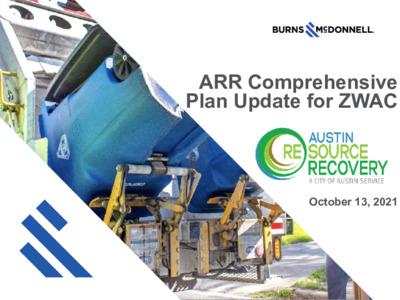ARR Comprehensive Plan Update — original pdf
Backup

ARR Comprehensive Plan Update for ZWAC October 13, 2021 Meeting Agenda Progress Update Select Strategies and Tactics Questions and Next Steps 2 Progress Update 3 Progress Update Early Improvement Recommendations Feasibility Matrix Preferred Strategies Benchmarking Research Key Definitions, Data/Technology & Policy Issues Analyze Multiple ARR Topics Establish Plan Goals & Objectives Identify Alternatives Evaluate Options Research, Analysis & Recommendations Develop Strategies & Options Multiple Strategy Workshops ARR Comprehensive Plan City/Stakeholder Engagement & Public Outreach Develop Implementation Timeline Develop Outline & Write Multiple Drafts 4 Project Schedule 5 Select Strategies and Tactics Legend Tactic Not Included in Previous Plan 6 Select Strategies & Tactics: Residential 1. Implement alternative metrics • Track per capita disposal to determine strategies for reaching Zero Waste goal • Set long-term (by 2040) 90 percent capture rate goals for all recycling and organic cart materials with short term focus on materials with high economic value (e.g., milk jugs, aluminum) 2. Capture residential material with the greatest future diversion potential • In the short-term, incorporate fees associated with contaminated setouts and provide the opportunity to waive the fee through continued education • Based on results of multi-family composting collection pilot, assess opportunities for multi-family composting policy 7 Select Strategies & Tactics: Residential 3. Increase access to proper management of hard-to-recycle materials • Expand door-to-door household hazardous waste collection service as a one- or two-year City-wide pilot and evaluate long-term feasibility • Begin planning for a north Austin facility in 2022 to expand services and access RRDOC Participation at the Recycle & Reuse Drop-off Center is currently concentrated in the four closest zip codes in South Austin 8 Commercial Franchise System ► Commercial recycling collection is currently provided through an open market with over 100 permitted private haulers ► An exclusive or zoned franchise system, which limits the number of haulers, would provide ARR with greater ability to regulate hauler activity and enforce requirements that support diversion ► Los Angeles and New York have recently or are in the process of transitioning from an open market to a zoned franchise system to help reach their Zero Waste goals ► Franchise system would increase routing efficiency and improve ARR’s ability to ensure consistent data, services, and messaging 9 Select Strategies & Tactics: Facilities and Private Sector 1. Plan transition to a Franchise System to expand and enhance Universal Recycling Ordinance 1 0 Select Strategies & Tactics: Facilities and Private Sector 2. Monitor processing and disposal capacity in region to determine future facility ownership • As the region has approximately 25 years of permitted capacity remaining, utilize a transfer station and/or support the development of a regional landfill • Zero Waste planning requires adequate disposal capacity as City reduces, but does not eliminate, disposal 3. Facilitate access to construction and demolition recycling and increase diversion • Support third party haulers in accessing privately-owned C&D processing facilities and increase recycling of key materials 1 1 Permitted Regional Landfill Capacity Limited to 25 Years 1 2 Utilizing a Transfer Station ► The City will prioritize utilizing a transfer station ► Hauling distance to the landfill can be up to 60 road miles round-trip from North Austin, indicating financial benefit of transfer station ► Transfer station would also provide environmental benefits: • Reduced carbon footprint from reduced fueling • Ability to electrify fleet due to shorter haul distances Graph source: U.S. EPA’s Waste Transfer Stations: A Manual for Decision Making 1 3 Select Strategies & Tactics: City-Wide 1. Focus on recruitment of secondary processors and end- users of material to support Circular Economy efforts Evaluation Process Facility Types/Business Operations 25 Zero Waste-related facility type/business operations evaluated Evaluation Criteria • Alignment with Zero Waste and social enterprise goals • Proximity to industry Innovation and tech • Recommended Facility Types/Business and Economic Development Tools Recommended Types Include: • Textile Upcycling Companies (within City) • Glass beneficiation • companies (regionally) Battery/energy storage manufacturers (regionally) 1 4 Select Strategies & Tactics: City-Wide 2. Expand the concept of Zero Waste community-wide • In developing new messaging materials, assume Zero Waste is still an unfamiliar term community-wide in messaging materials • Continue city-wide messaging of consistent diversion practices, with a focus on the appropriate program materials for each cart as a part of a continuous City-wide awareness campaign 3. Determine a long-term strategy to transition to a Circular City • In developing a long-term strategy to promote City-wide behavior change towards waste reduction and reuse, ARR may consider the following: • Coordinate with industry groups to drive policies that disincentivize purchasing of single-use products and promote “right to repair” • Consider alternative rate structures to reduce consumption ARR is implementing a department equity tool to inform operations and policy 1 5 Questions and Next Steps 1 6 Additional Questions? Scott Pasternak Burns & McDonnell 512-872-7141 spasternak@burnsmcd.com Jonathan Ghysels Burns & McDonnell 737-263-3378 jaghysels@burnsmcd.com 1 7